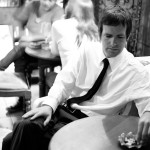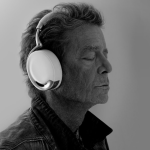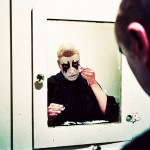
[Photos by Scott Irvine]
Interview by Micah Kelber
Before you assume Jolie Holland‘s just another singer-songwriter, know this: Tom Waits is her “fairy godfather” and she’d love to tackle a collection of phonetic Vietnamese cuts sometime soon. Her new Anti- album, The Living and the Dead, also speaks for itself alongside the following MP3s …
[audio:http://www.self-titledmag.com/wp-content/uploads/audio4/Black_Stars.mp3] [audio:http://www.self-titledmag.com/wp-content/uploads/audio4/Old_Fashion_Morphine.mp3]“ART AND WRITING–IF IT’S ANY GOOD–IT’S GONNA HAVE BLOOD IN IT”

self-titled: You are playing Carnegie Hall at that [REM] tribute in mid-March. Do you know what you are playing yet?
I’m going to play “Don’t Go Back to Rockville.â€
You traveled across the country when you were younger. Was that with your family or alone?
I was doing it alone, when I was 19.
How did it start?
I was living in Houston and I didn’t really know what I wanted to do with my life. I had been living with my boyfriend and we were both accepted to the Museum of Fine Arts in Boston, but then he lost his mind and I moved back in with my mother. I wasn’t sure if I wanted to go and then I had a dream where an old friend of mine, Court, appeared. It was one of those dreams where you wake up and everything is exactly as it was in the dream, except for that he had been there, standing in my room saying “You have to follow your dreams.â€
So you had a dream tell you to follow your dreams.
Right. So I drove up to Austin, having no idea where to look for him, but in a city of close to a million people, it took me 45 minutes to find him. I told him that I could stay in a motel, but he said, “No, we’re staying in this squat.†There, I met all these incredible people: Jana Weaver, Stefan Jecusco (who made my violin). Those people were by far the best and most sophisticated artists that I have ever met. They invented their own religion where they stumbled upon all of these things that ancient religions believed were the ground of truth and it showed through their art. The song “Fox In Its Hole†off The Living and the Dead refers to secretly squatting in the city and to that sort of spiritual independence they introduced me to, a maintenance of a separate identity in the midst of a city with a strongly contrasting worldview. They are people who are beyond this world. They are here, but not here. After I met them, I kept traveling.
Did you have music lessons when you were younger?
Definitely not. I learned to play the piano because my parents put it in my room because no one wanted it in the living room and I was the only one who played it.
Do you keep a journal? Did you keep a journal when you were younger about those experiences?
I write all the time. I write on the subway a lot.
A lot of your songs are about rural themes and use rural imagery. How does writing on the subway, the most urban thing around, make that possible?
Funny, you should say that. I just wrote a song on the train about an experience I had in Williamsburg–about mocking birds that suddenly appeared. The subway is really just empty time for me to write.
Do you think about your fans and how much you want them to know about your personal life through writing or in your songs?
Yeah, I don’t know. [Laughs] I think it was Jack Kerouac who said, “Fame is old newspapers blowing down Bleecker Street.†Art and writing–if it’s any good–it’s gonna have blood in it and I’m just not here to write stuff that I don’t think is good for any kind of bullshit egotistical reasons. I think that just makes bad art if you’re too scared to reveal anything about yourself. Then you have blocks up in your art then it’s not going to be good for you and it’s not gonna be good for anyone else. It;s just not going have the power to move anybody.
You’ve been very influential for a lot of people at such an early age :
I’m an old lady! What are you talking about?
What do you mean?
I’m 33 years old! I’m an old lady!
In terms of the life of songwriters, is that old?
I don’t know. I got so much bullshit when I was 28–a few years ago people were like “You’re so young and you’re writing all this.†Blah blah blah. And I was like, “Yeah whatever, 28 is not that young. It’s ridiculous that you’re making such a big deal out of it.” And then now that I am 33, I’ve had journalists act like I am so old.
“Spooky Little Pony” live
Other journalists have mentioned how many contradictions exist in your life. Sage Francis came up as being an odd bedfellow, for example, along with your involvement in hip-hop.
I love singing with Sage Francis. And I’ve always had friends who were really good underground rappers, but I am just not around those people right now. To someone who doesn’t know me and who only likes my music for a few reasons they would be surprised to hear me playing with experimental musicians. The people who see contradictions in stuff like that, I don’t know who they thought I was in the first place? I’ve always played violin in experimental bands and I’ve always had good friends that are rappers, so there is nothing contradictory about that for me.
I read something about how songwriting sometimes takes the place of crying for you.
Sounds like a journalist misunderstanding what I said.
It was here, in the Chicago Tribune. You said, “I was doing something that I should have actually gone to the doctors to do and it was so stupid. I tried this really crazy herbal thing to try and deal with the situation and it was just so stupid and I just hurt myself and then I was just sitting there and the song came on it was really inspiration. It was something to do instead of crying.”
Oh, yeah. I remember that.
What was that song?
It was “Nothing To Do But Dream.†The kind of music that I play, and the cultural musical roots that the music came out of, I really feel close to them. People played these songs of misery, and for whatever reason, culturally, that’s the theme. In a way, as a songwriter and a romantic–whatever it is–that kind of crazy melancholic sort of stuff, I just figured growing up listening to that kind of music, that’s just what I thought songs were about.
So you just had to be emotionally available in that way in order to access them.
I guess so. I mean have you ever listened to [Willie Nelson’s] Crazy: The Demo Sessions. It’s amazing. The themes of the songs are totally devastating. Sometimes I try and understand what the purpose of those songs are in people’s lives, and in that sense I think about these dudes who it is not okay for them to talk about their feelings, and they barely even think about feelings themselves and so they need this really strong emotional medicine through the music as an antidote to that kind of lifestyle. It’s the Tylenol in the medicine cabinet. It’s just there because people use it and they need it.
You don’t strike me as the kind of person who would deny her voice in ordinary [non-musical] situations that would cause you to gravitate towards that kind of music because of that need.
Right, I’m not and I don’t. Because I know I am a songwriter, it’s hard to even think about what I use music for. I think that music is like acupuncture that’s there to help people move their energy. If something is not useful to that, I won’t listen to it. That to me is the definition of bad music: if it is incapable of moving energy and it’s there to repress energy then I can’t listen to it and I actually believe that it’s harmful.
Have you ever met Willie Nelson?
I once opened for him and he was so sweet. He remembered my twin uncles and asked how they were doing. I’ve never met Tom Waits. I’m pretty sure I’d be nervous. I can get really super shy.
But Tom Waits is a fan of your music.
At this point he’s kind of like my fairy godfather.
That would be why I would think that he would like talking to another songwriter and one that is also a fan of his?
He’s really busy. He has five kids. I once thought of sending him some music of friends of mine, things I thought he’d like and some homemade absinthe–a friend of mine is a moonshiner. He doesn’t drink, but his wife would have loved it.
Anyone else you’d be nervous to be around?
Well generally, I’m shy. But, Will Oldham. I’ve been listening to him for so long. I met him once and asked him if he had heard of my old band, and he said he hadn’t. But I found out later that it wasn’t true.
He lied?
No, I think he just didn’t know that he had been listening to me, or something.
“Mexico City” music video
Have the songs for the next record been written?
A lot of them have. I’ve had a lot of things that I’ve been working on. There’s one song that was supposed to be on the last record that I couldn’t get on it, because I couldn’t find a drummer that could play it. I found the best studio drummers in New York–the best–and when I played the song something just wasn’t working. I asked one of them, “What are you hearing in this song?†And he said, “Something like an early New Orleans Jazz song.†So I tried to get them to see it the way I saw it–I brought up Bob Wills and they had never heard of him.
It’s like I said, “Let’s make a sculpture of this animal†and I was trying to make a bird and all they knew were dinosaurs. There was a missing link. We couldn’t play it together. It made musical references that point vaguely back at Texas swing, but it’s evolved a ways from there. I didn’t even know it was an evolved Texas swing ‘til I had to figure out why our communication wasn’t working in the studio. Someone once said that “culture is what you don’t notice†and I realized what that meant by this episode. That’s why having connected musical roots with the people you’re playing with is so precious. It was like looking at an insect that didn’t have wings and not being able to figure out what it was, the taxonomy was all wrong. They couldn’t see what was no longer there and so they couldn’t do it.
So who’s going to play that on the next record?
JH: There’s a drummer I met at Union Pool, Ryan Sawyer, who can play the fuck out of that song.
Are you mining more old traditional songs?
Probably. For one thing, you don’t have to pay anyone if you use the really old ones.
Anything else you are thinking of doing?
I’d love to do a record where I got to sing in phonetic Vietnamese.
Really?
Yeah, it’s so beautiful. They can sing–I am not sure if this is the right way to say it–two notes at the same time. The closest I can come to describing it is like in Fado, or yodeling.
There’s a real moral component to your songs and a certain ethical sense that comes out of things you’ve said. For example, there’s the song that you sing about wishing you could have been there for your friend. You’ve also talked about how irresponsible Kerouac was. In what way does morality play a role in your art?
At bottom, I think that morality is about who you consider your community–who you either know or feel kinship with. Music has a specific micro-cultural power to unite groups of people and I am really aware of who my people are and feeling responsible for them. The music and the messages mean a lot specifically to my friends and my community. It means certain things to us that it won’t–I don’t know what other people get out of it in a way. It’s almost like me listening to African music, like they are listening to something that comes out of my micro culture. They won’t ever understand it the way that we understand it. But within my specific community, I have a strong sense of responsibility to us and I keep people around that have that same sense of responsibility to me. So the moral messages come out of that community.

Can you tell me about the situation in “Corrido Por Buddy“?
That was definitely my public service reminder. If there’s someone around who is just holding on and you like that person, you should make sure that person knows because maybe their thread is getting thinner. That’s about having missed a window of opportunity. When I was in Portland, I was spending time with a lot of people who happened to be former Mormons. They rebelled from their parents, but Buddy actually decided to try and make it back. I was introduced to him by my friend Stefan Jecusco. I didn’t know a lot of people who had killed themselves before and it affected me. I never got a chance to tell him that I liked him.
When we were recording the song about him, Stefan had come over. [Co-producer] Shahzad [Ali Ismaily] and Rachel [Blumberg] were downstairs in this house and I was upstairs. While they were recording the track, there was a chandelier above them that had both white lights and red lights and all of the white lights kept blinking on and off. Just the white ones. We checked to see that they had been screwed in tightly and they were. Then, when I was back at Shahzad’s place in Bushwick, there was a chandelier over my head and I was singing it again, and the lights were blinking on and off again.
Then when we were in Salt Lake City, where Buddy killed himself, I was really sick. I was coughing really badly. One night Rachel thought that I got in bed with her. She heard someone taking off a belt or something and then hearing change fall, and then she felt the side of her bed get pushed on. She assumed because I was so sick, I had just fallen into the wrong bed, but when she looked up I was across the room.
What do you make of all this?
I don’t know. I don’t know if he was trying to communicate something, or even if it was him. Even if there was someone to ask if it was him, their opinion wouldn’t mean as much as the fact that we thought it was, anyway.
When you were talking about Willie Nelson music and all the misery that was around him at one time, it struck me because you look so happy on the cover of your new album.
[Laughs] That’s really funny. I was at a party and that was just a snapshot from a great photographer, Samantha Parton. Internally, I was having an awful time. I was also having a great time. There was part of me that was freaking out, so …
Could you imagine being happy, as both an artist and songwriter?
Yeah, totally! I am around a lot of artists that do that well. I feel really blessed to have the kind of circle of friends that I do and I have great examples of the non-tragic artists.
There’s some interview you gave about Kerouac and you called him, I think, “a lame ass alcoholic†and that he ignored his daughter and was irresponsible. It made me think that, to the contrary, you have a lot of artistic influences who have it together.
Yeah, definitely.
Did you have any religious background?
I was raised half Agnostic and half Jehovah’s Witness. I remember having to recite the order of the books of the Bible before I could go out to play.
That’ll make you love religion:
But legally I am Jewish.
What do you mean, legally?
My mother’s mother’s mother was Jewish.
That’ll do it. Have you ever investigated that side of your family?
I asked my grandmother, Bertha Golding, about it but she didn’t say much. She wasn’t a practicing Jew. In fact, quite the opposite.
Did you ever explore that side of your heritage?
I read about it–some introductory books about Judaism. I’ve always been a voracious reader, but I don’t really even begin to know what having that in me means.
How did Jews get to East Texas?
I really don’t know. The nearest big city is Shreveport, so maybe from there.
My guess is that Judaism would appeal to your sense of storytelling.
Yeah, maybe.
Are you in touch with who your fans are?
Not really but I know I have them. When people come to my shows they are impressed with the diverse age range of my fans. They really are an interesting looking crowd. People also say they are really quiet.
Which I guess means they are listening.
Yes.


